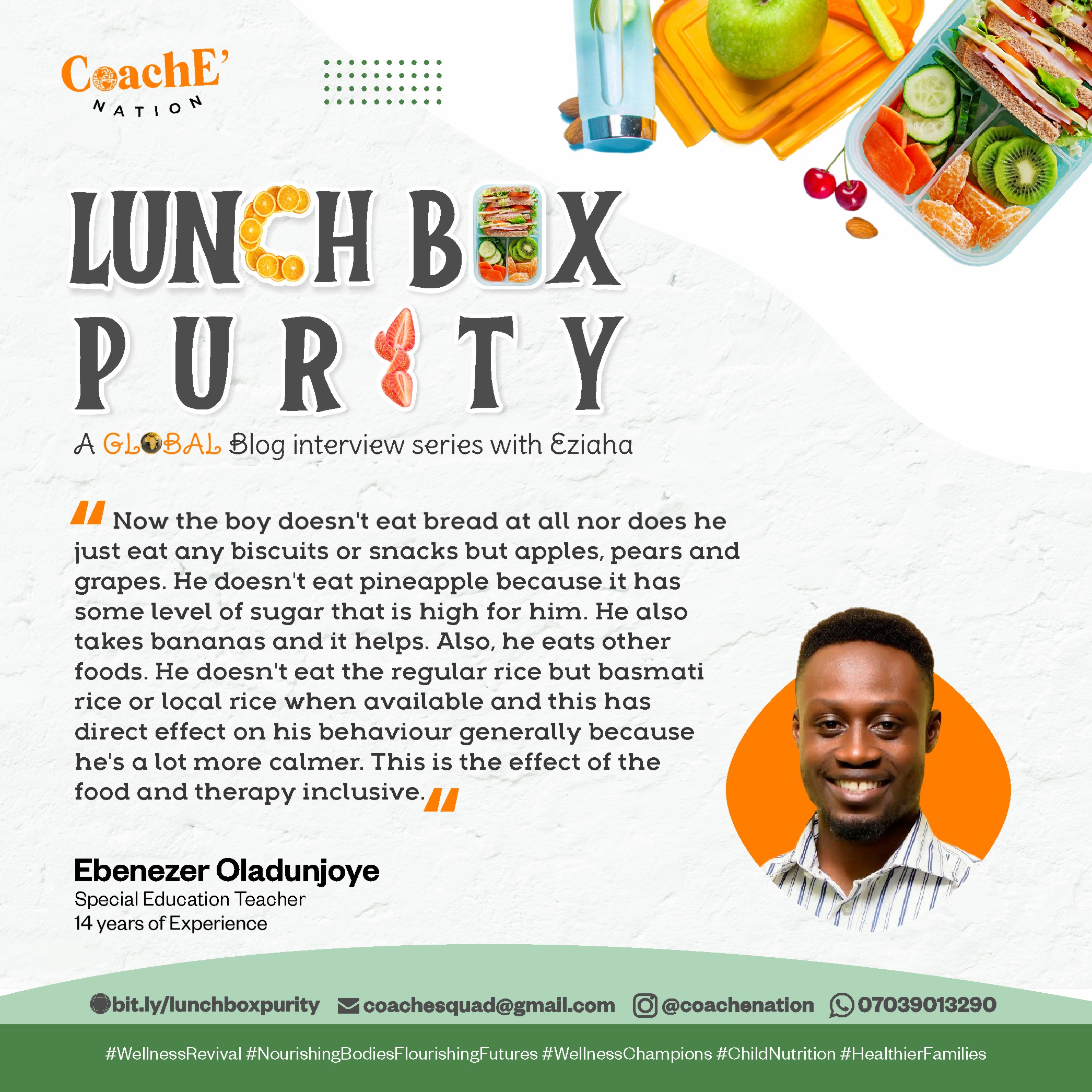Diet and nutrition play an important and essential role in everyone’s life. It helps build a healthy body and a strong mind. Children with autism and autism spectrum disorders (ASDs) are commonly affected by eating disorders. Their preference for energy-dense food with low nutrition can alter their metabolism, leading to the accumulation of oxidative radicals, causing them to deteriorate mentally and physically. Although dieting and losing weight are now commonly seen in the general population, it has become hard to bring awareness to children with special needs about diet, nutrition, and obesity. Despite efforts, parents of such children usually cannot help control the eating because tantrums and behavioral problems are common. It is now imperative for doctors and parents to work alongside nutritionists and dieticians to help these children eat healthy to be fit and improve the quality of life.
National Library of Medicine Research on Diet, Nutrition and Exercise in Children with Autism and ASDs.
This research is just so brilliant and you can read more about it here
However, I just really wanted to emphasize how diet and nutrition play such a major role for special needs kids. The article mentions Doctors, Parents, Nutritionists and Dieticians working together, and I dare add Educators.

Which is why I am super excited to introduce our fourth (already!!!) Educator on this incredible Lunchbox Purity blog series, and not only do we have our first man (yay!!!), he is also a Special Needs Educator! Yaaaaaas!
Oh I am so excited for you to dive deep into this absolutely brilliant interview that I will right now step aside elegantly! Honestly, it was too good. WOW! Even if you are not a special needs parent, I can assure you that you will learn many things so get comfortable and enjoy this healthy ride!
Over to Ebenezer Olatunde Oladunjoye

1. Please tell us your name, where you currently teach, years on the job and how you got into the beautiful world of education.
Answer
My name is Ebenezer Olatunde Oladunjoye. I am a special needs educator. I work with kids with special needs especially those with developmental disorders like Down Syndrome, Autism, hyperlexia, Dyslexia, ADHD to name a few. I’ve been in this field for about 14 years and I’ve worked with different families. I don’t really work with schools as much but I work mostly directly with families of children with special needs and those kids do school support, and school shadow on a needs basis for the kids. I have also worked in Support Centers and in the Down Syndrome Nigeria centre in Lagos. I was trained in this field in South Africa.
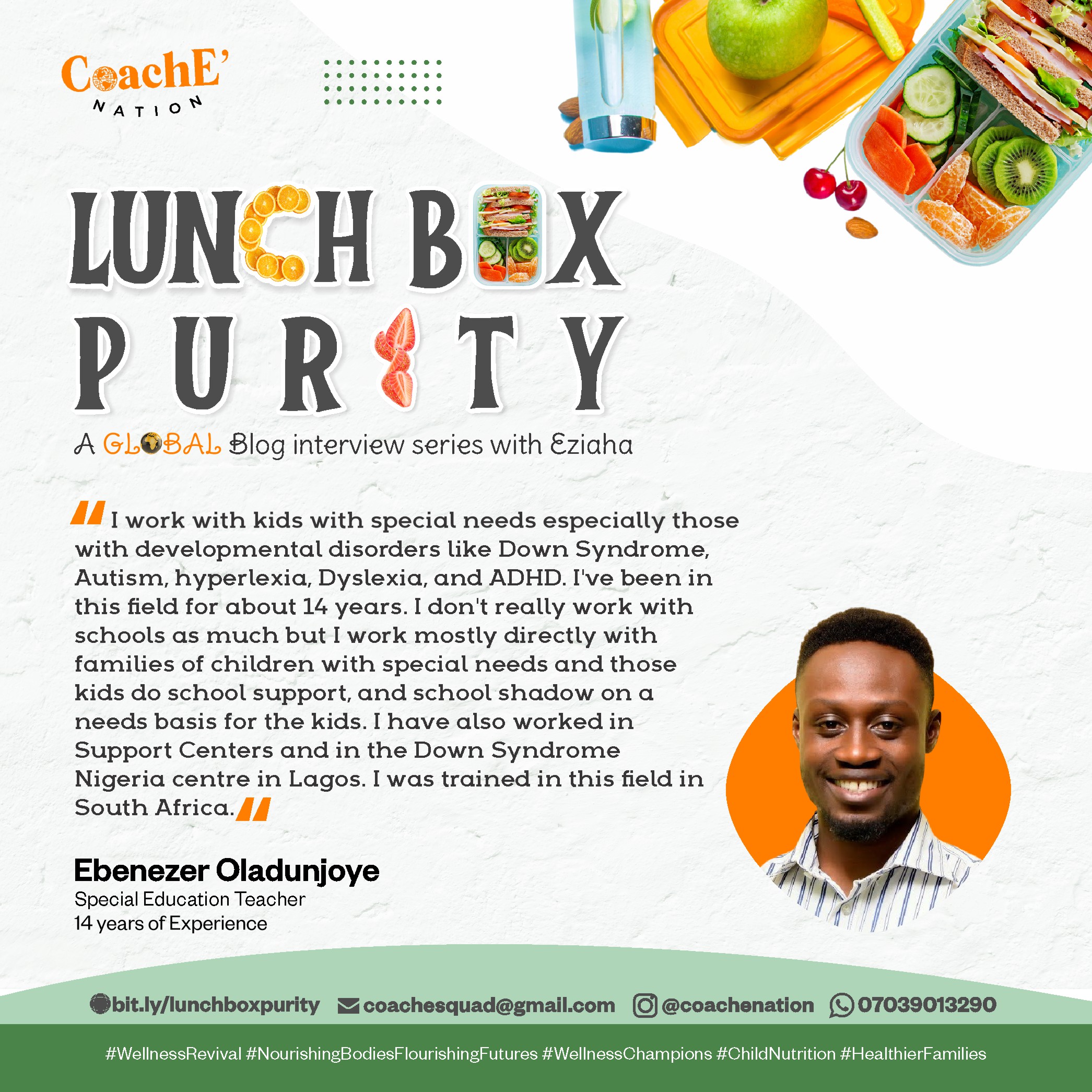
2. Share with us your most significant/memorable experience as an Educator
Answer
On this journey, I make sure that I make a difference with each kid and I always desire that parents see what they are paying for. My first major experience is working with a set of twins. Their mom had initially used a Centre but could not continue and desired homeschooling. She contacted me and explained what she wanted and even though I didn’t have as much experience as now, I was giving my best and things started shaping up especially because the parents are not laid back and are very involved in the process, including what foods they allows their kids have, and the right environment that aids their learning. This family invested so much both in academic resources and diet. It was then I realized that kids with autism or special needs can’t eat just anything. These kids were on a diet of healthy foods, many of them imported and you could tell the difference; they were not hyperactive and their brains developed well even though they were on a spectrum and everything you teach them, they understood. As at then, they were even struggling with feeding because they didn’t eat everything but the nutrients were enough from eating right. Because she saw the value I was bringing to the table, I had to follow the kids to South Africa
which also allowed me to get some training. The last time I checked on the kids, they were not in Nigeria and they should be about 16 years old now and they are doing well.
Another remarkable experience was working with a child I met in South Africa and I had to follow the family to Abuja. This child would cry the whole day because he was just being fed almost everything, and he was not getting the right amount of therapy or the right method to help him out of the health challenge. I was able to step into the situation and we made some modifications, including putting him on a diet. In about a term, the boy that was unable to do anything ; he couldn’t write, he was very hyperactive with extreme behaviors, throws a lot of tantrums and cries the whole day, he started reading, writing and taking simple instructions. I eventually brought in a friend to take over as I had other commitments but by the time I was leaving at the end of first term, things were already in place. While some of the symptoms in special needs children may not go away completely, they can really be well managed and diet especially helps a lot.

Finally, and to keep it short, I worked with a family who found me on Facebook. The first son is on the spectrum and the daughter had delayed speech. The mum made sure the kids only take gluten-free food and minimal sugar especially during the week (weekends were minimally flexible). Guess what? He’s in Upper Elementary School right now and he’s doing well. He goes to school alone and takes instructions alone. He communicates really well and when he does things, you can hardly tell if he’s on a spectrum even though he is. Their parents followed the due process, academic and diet-wise. Both have to work hand in hand for success to happen progressively.
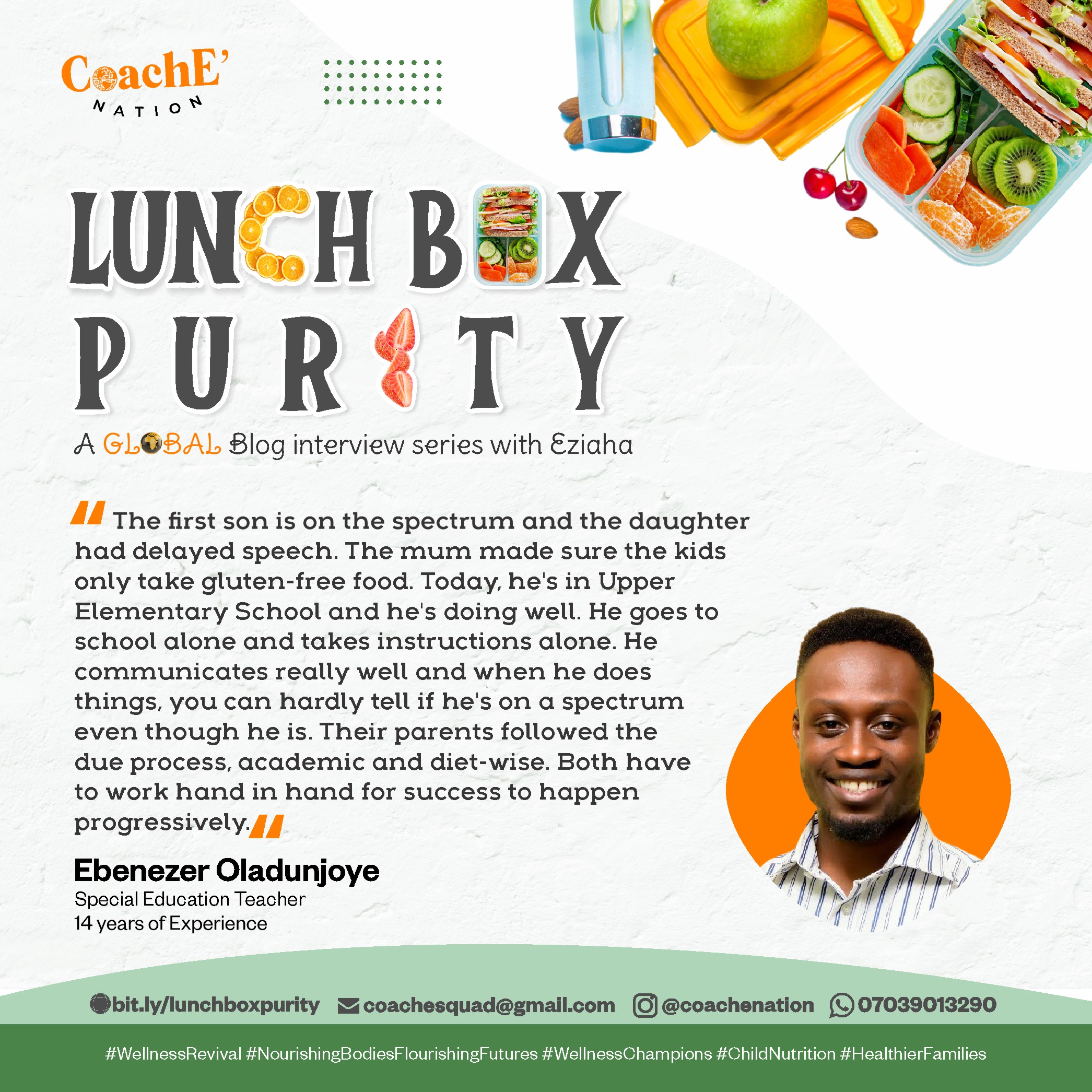
3. Are there times when an Educator (you or someone else) has had to intervene per the content of a child’s lunch box, especially when you can see that the frequency and volume cannegatively impact on the child’s health both short term and especially long term? If yes, how did that go and/or how can an Educator help/intervene without coming across as being judgmental? How do we educate that child and/or the parent into better and healthier decisions?
Answer
I’ve had to intervene in the content of children’s lunchbox most times when I do school shadowing and even though I don’t work directly with the kids, I have a concern about what I see them eat. As an educator, some of us support the teachers too. The best thing to do is to observe, not just the food but the behavior after the food. In ABA (Applied Behavioral Analysis) this is what we call the ABC of Behaviour. We have the Antecedent which is the A, the B which is the Behaviour, and the Consequences which is C. When there is any kind of behavior, something must have caused it. So we check to see whether it was the snack that caused the (for example) hyper-activeness, meltdown or making the kid easily triggered. I could have a discussion with the teacher first to get their view and see if we are on the same page. Recently, for a kid I was working with, the teacher agreed with me, and she started to control how much of the snacks the child takes at school. Then during the Parent’s meeting, she discussed it and I also lent my voice. The intervention here is not merely to withdraw but to replace gradually in a process that ends successfully. This involves a lot of communication between both parties and we share tips and ideas about what food would work without adverse effects especially effects like hyperactivity because truth is, a child cannot learn much when hyperactive. They just want to burn all the energy if their diet is high on refined and white sugar. This is true whether at home or in school so those kinds of sugars must be absent to minimal in the kids’ diet.
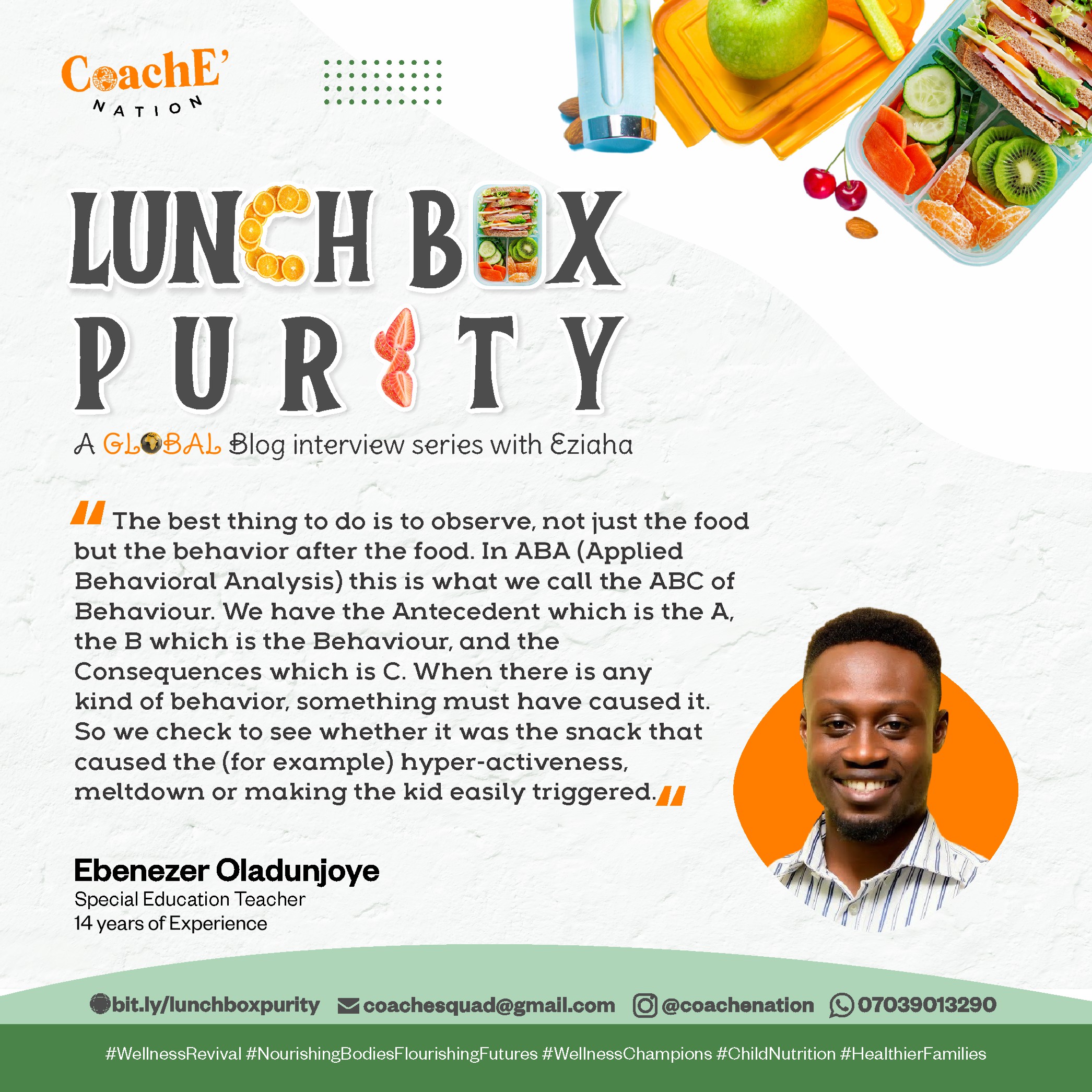
In Nigeria, we do have healthier options but most times, we forget and go for store-bought and chemical-full foods. We don’t even need to buy the expensive gluten-free diet, but just our regular local foods. But the Educator cannot be judgemental; you must understand that the parents also go through a lot with their special needs children. The taste buds and desires of their kids change fast and even though they accepted rice and stew from you today, the next week, he will not touch the same food but insist on pizza for breakfast, lunch and dinner. This can get really hard for the parents and somehow, the child has to be fed. It is especially harder when a child has gotten used to junk foods over time so if the Educator is kind enough, they can work closely with the parents, sharing tips and ideas to help everyone win
as transition to healthier foods happen.
4. What role can parents play in supporting your efforts to promote healthy eating? How best should we communicate with parents about the importance of nutritious lunches? Do you have any practical success stories on this?
Answer
The parents do have the major role to play. A behaviour does not just start, something causes the Behaviour and in psychology we learn that as the parents we are our children’s role model especially in modelling healthy eating.
For instance at home if you are always buying junk for your kids or always eating out, then the children will always demand for it and it becomes the normal way of life for them. So for the sake of the children, parents need to start cutting down junk and eating healthy so as to model this to them directly. If you eat healthy then they will also eat healthy. If you serve healthy food at home, they will eat healthy. If you eat lots of vegetables and fruits and minimal junk, they will pick that from you. You can’t just tell, you have to show.
I spoke about a family I worked with and what they eat and to be fair that was how their mum usually eats too. She eats vegetables and takes fresh juices. She doesn’t just buy and eat anyhow. I tell the parents to try as much to model the actions and habits they want to be permanent at home as this has to come through a relatively normalized experience as well. It is what they see you do, what they see happening at home and around them that their eating habits will be formed.
5. If you are a special needs Educator, what have you noticed about the impact of food and a
child’s ability to learn or otherwise? Do you have any experiences to share?
Answer
The impact of food on a child’s ability to learn, retain and recall is a big one. The first process is for the child to even be calm enough to learn and sometimes teachers can relate to this. On Monday, you find out that your classroom is mostly disorganized. They are running up and down, shouting and doing things they were not doing on Friday. It’s like you are starting all over and even for us in Special Education, it’s the same. Mondays greet us with shorter attention spans.

Every Monday you have to do a reset. You have to kind of prime the child all over again because over the weekend, some of the structures you have put in place would be lost. Some of these kids when they go home are over indulged. Over the weekend, they had unlimited ice cream, juice, pizza and more. Some parents just want the kids to be free over the weekend after a week of careful dieting. All of these tell us that whatever the child is eating has a big impact on the attention span.
They can only sit down for a short period of time to take instructions. If the instruction is taking too long then they are not interested again. If the instruction is becoming too broad, then they find it really hard to comprehend. It’s because the brain is working at another level; they just want things to happen really fast. They find it hard to delay gratification; they find it hard to wait in turn. It is the accumulation of what is in the system. The system wants to run it out. The brain is working really fast. It’s the diet that’s affecting their ability to learn. Kids with ADHD or Autism, if you watch when they have eaten things that put too much sugar in their bodies, they become restless. You cannot work and achieve anything with a child that is restless because the next thing you get is a behavioral meltdown as the child wants to escape and learning is just impossible as they child may just start crying if you want to push through the behavior. A crying child cannot learn anything. A child that cries for 30 minutes during a 1 or 2 hour session cannot achieve anything with you. The child can decide to roll on the floor, sit awkwardly, keep shouting or saying something else, and you won’t be able to even input anything into the child. Why? Because of their eating habits which goes a long way to decide what they learn and how far they can learn.
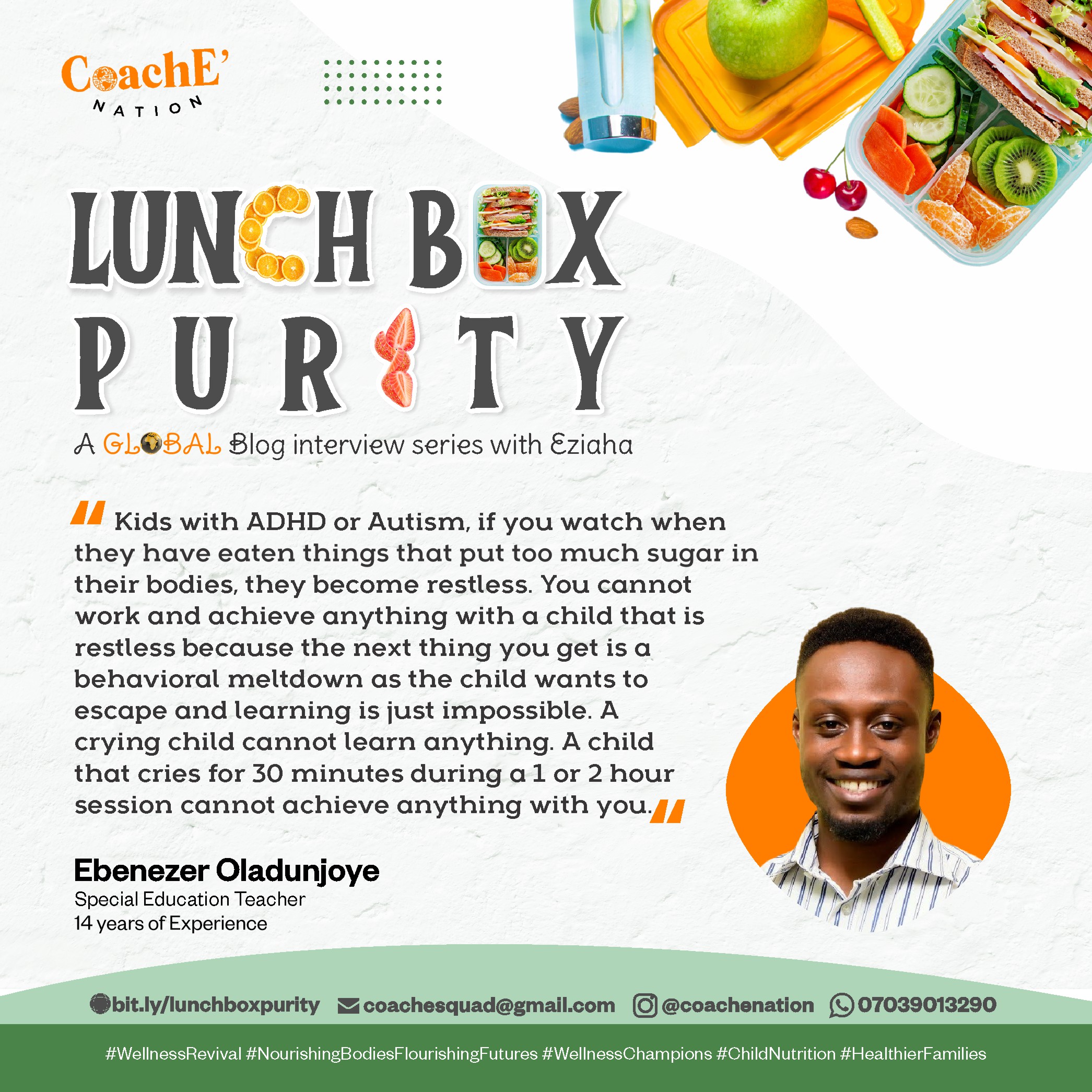
This is why it is very good to allow the child to eat healthy generally. Thankfully in Nigeria, we have some of the healthiest and most organic foods they can feast on with minimal to zero issues.
6. Do you have any suggestions for Special Needs Educators to unite and create a forum/melting pot where they can rub minds especially when it comes to diet and lifestyle of kids with special needs so that they can help even more kids, Educators and Parents? Does anything like this exist? If it does, how helpful is it? And if you don’t mind sharing, please do? If not, do you have suggestions for how to optimize?
Answer
I don’t know if there’s an association of special educators that looks into dieting in Nigeria but I do know that when I was in South Africa there is one course that has to do with Biometrics and it includes what the child eats and then medication. I think it’s really helping because in South Africa then, I remember a particular center advised the parents to strictly put their kids on a specific diet they prescribed. They also do allergy tests to tell what is good for the child and what should be taken away. I remember one of my clients then would not feed the child fish because it contains mercury and she found out that mercury triggers some level of hyperactivity. Information is everything. In Nigeria I don’t think we have but what we should do as special educators and parents, is that we should work with food scientists so that they can help us out. It is important that Professionals are brought into that situation as opposed to guessing especially with foods and supplements, as we don’t know what the kids may be allergic to.
Parents should consult Labs and do allergy tests for their kids to know what they are allergic to and be guided professionally when getting the kids on any diet to ensure that no needed nutrients are left out. It is not just about buying (for example) gluten-free foods. You have to be guided right. While it is a lot of work, parents must please go all out for the sake of their kids. You should visit a food scientist, do an allergy test and get results and know what is good. You should know what should be taken away and added to the child’s diet. Please don’t just copy and paste from another parent. What gets another kid behaving well may not work for yours, and feeding is a very tricky thing so get help and follow due process. Same goes with supplements too.
If the child is allergic to any form of food, it also affects your productivity as a special
educator. It affects their behaviour at home. More expert advice is needed in Nigeria right now for feeding and nourishing special needs kids, and this is my suggestion to any parents reading this: go the extra mile in getting professional help to know what to be given to your child, what should be added and removed before placing them on any diet.
7. Do you have any cool stories on how a child’s diet can directly impact learning and contribute to creating a more conducive learning environment for students? How does what a child eat for breakfast and at lunch, snacks inclusive, affect how they show up in the classroom?
Answer
Yes the second story I shared earlier about my experiences, I spoke about the child whose family I followed to Abuja. The truth is that it’s a success story for the parents because the mom had to look into what the child eats, and removed things like bread which has a lot of gluten because of the wheat and can cause leaky gut, replacing it with gluten-free snacks and fruits. This boy who literally could cry the whole day, as in he wakes up some days and cries from morning till evening, but gradually this behavior started fading away as she changed his diet. He sometimes would even injure himself by biting himself but these also faded as he started to understand his own body more. When his diet was off, the problem was that he couldn’t really feel himself. Something was always affecting him and you know the leaky gut affects the brain. If they were not careful, he could run out of the house and just keep going. As his gut got repaired, the brain settled down and he learned faster. He learnt to read, write and do his mathematics. When I came, he couldn’t do or learn anything even though he was over 5 years at the time.He couldn’t even count or identify number 1 or identify the basic sounds. But before he was 6, he could read basic words and texts in a book and he could count 1 to 100. He could write his name and he started copying from the board and could color. You can walk with him and he’s not going to run away because he was more in control.
Now the boy doesn’t eat bread at all nor does he just eat any biscuits or snacks but apples, pears and grapes. He doesn’t eat pineapple because it has some level of sugar that is high for him. He also takes bananas and it helps. Also, he eats other foods. He doesn’t eat the regular rice but basmati rice or local rice when available and this has direct effect on his behaviour generally because he’s a lot more calmer.
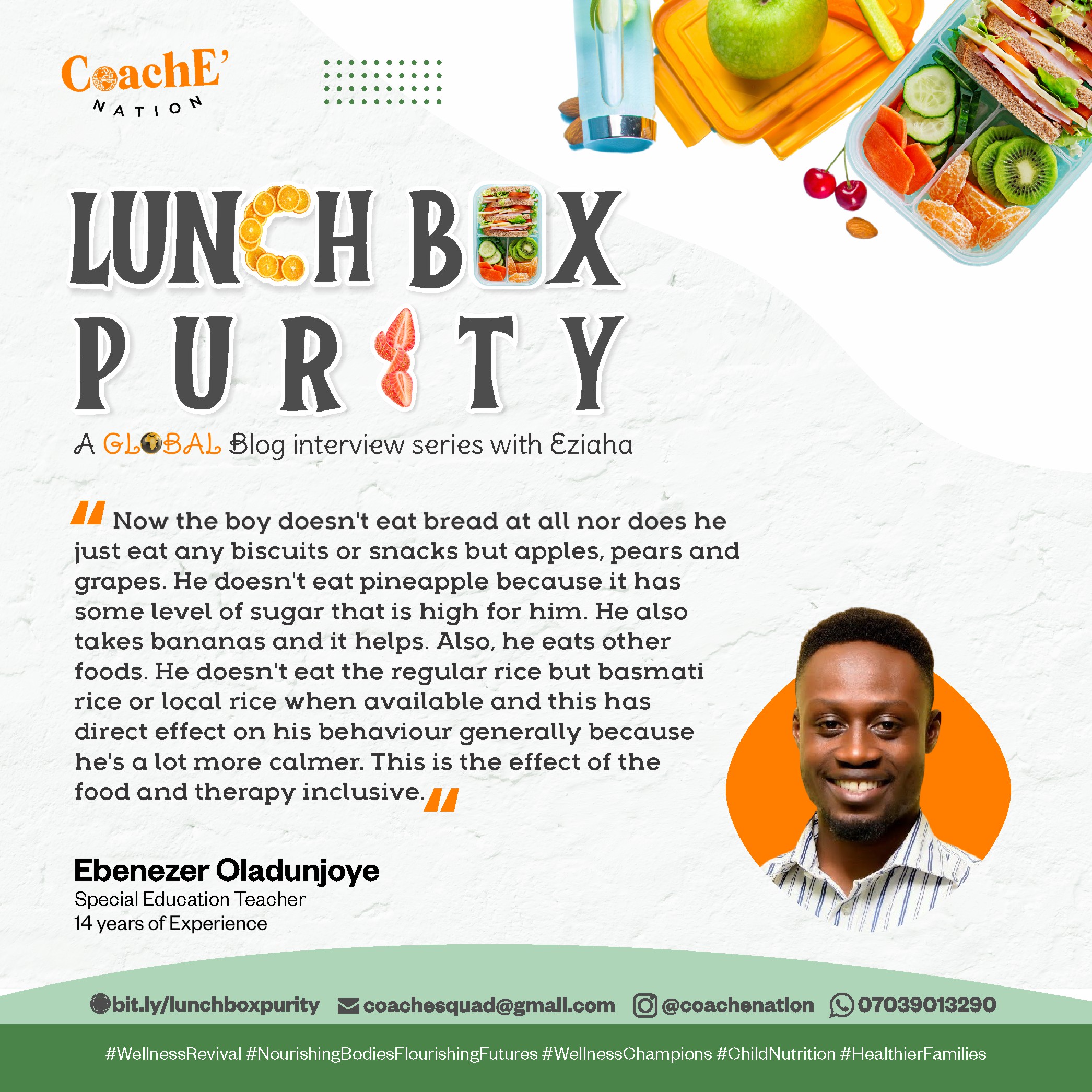
This is the effect of the food and therapy inclusive.
Your Turn/Last words
Finally, I would just advise the parents that they should take special interest in what they feed their children as it will go a long way to determine their behavior both learning and interacting with their environment. Also if your child is a special needs child, don’t just make a decision based on what you are hearing from someone. Consult Professionals, do allergy tests, learn what your child can eat and not eat, and know what supplement to take. It helps a lot. Don’t just be laid back. Make an effort, and even when you get advice, confirm that it works for your child. That’s my counsel for parents with special needs kids.
I know it’s really hard, I know it’s tough and it’s expensive but also you don’t have to go and buy foreign food. Consult a Nutritionist in Nigeria to help you out. There are lots of locally healthy foods in Nigeria that are way better than the ones you can get abroad. They give better nutrition and do not have chemicals in them but first know what to give your child. Know what your child will react to and what they will not react to. It is better and safer that way.
Next week Monday, we are featuring our fifth Superstar Educator. They actually don’t get to answer the same set of Q’s so get excited about reading a wide array of Q and A’s!
And please support and spread the WORD that the LUNCH BOX PURITY blog series is LIVE!
You can create your own customized flier here and then share the link to the amazing Parents and Educators in your circle.
Educating parents is a major part of this fight. Which is why we have the NOURISH-FLOURISH Moms club. Details about the Club can be found HERE so if you need some hand-holding, jump on board the next one.

Ok, see you next Monday with our Super star Educator talking LUNCH BOX PURITY!
With all my HEALTHY Love!
Eziaha,
Wellness Revivalist and Lunch Box Purity
PS
Healthy Moms raise Wellness Champions! Need to get healthier as a Mom? Or Mom-to-be? Our JOYFUL weight loss squads are the best place to be, especially if FOREVER RESULTS is your goal!

And if you prefer a PRIVATE coaching experience, then let’s work together to get everyone and yourself to go WOW. Send me an email at Coachesquad@gmail.com

PPS
And yes, my book, WELLNESS CHAMPIONS also launches in June 2024, on my birthday so look out for that one!

PPPS
Follow me on my brand new IG here after being away for over four years, and on LinkedIn here. My YouTube channels is value-choked and you can join that family here
